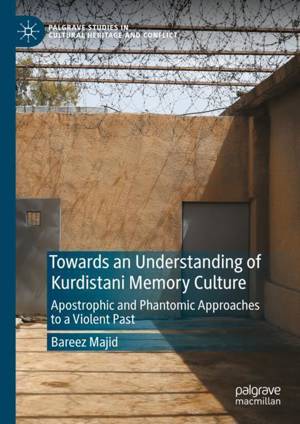
Door een staking bij bpost kan je online bestelling op dit moment iets langer onderweg zijn dan voorzien. Dringend iets nodig? Onze winkels ontvangen jou met open armen!
- Afhalen na 1 uur in een winkel met voorraad
- Gratis thuislevering in België vanaf € 30
- Ruim aanbod met 7 miljoen producten
Door een staking bij bpost kan je online bestelling op dit moment iets langer onderweg zijn dan voorzien. Dringend iets nodig? Onze winkels ontvangen jou met open armen!
- Afhalen na 1 uur in een winkel met voorraad
- Gratis thuislevering in België vanaf € 30
- Ruim aanbod met 7 miljoen producten
Zoeken
Towards an Understanding of Kurdistani Memory Culture
Apostrophic and Phantomic Approaches to a Violent Past
Bareez Majid
€ 126,95
+ 253 punten
Uitvoering
Omschrijving
This book presents a thorough analysis of the Kurdistan Region of Iraq's memory culture, focusing particularly on commemorations and representations of the Anfal and Halabja atrocities. The author employs a transdisciplinary approach that draws on Memory Studies, Postcolonial Studies, Heritage Studies, Kurdish Studies, Literary Studies and Trauma Studies, to analyze cultural objects such as Kurdistani literary novels, museums, and school curricula. The book introduces two key concepts: the "phantomic museum" and the "apostrophic museum." The former explores the fragile and politicized nature of memories of missing individuals who disappeared during Saddam Hussein's genocidal campaigns and who have never been found, primarily as they return in the Halabja Monument and Peace Museum. The latter examines how the addressing - apostrophizing - of Kurdistan, in and by the Amna Suraka museum in the city of Sulaymaniyah, institutionalizes "official" and highly politicized versions of the past.
Specificaties
Betrokkenen
- Auteur(s):
- Uitgeverij:
Inhoud
- Aantal bladzijden:
- 308
- Taal:
- Engels
- Reeks:
Eigenschappen
- Productcode (EAN):
- 9783031375132
- Verschijningsdatum:
- 21/12/2023
- Uitvoering:
- Hardcover
- Formaat:
- Genaaid
- Afmetingen:
- 148 mm x 210 mm
- Gewicht:
- 539 g

Alleen bij Standaard Boekhandel
+ 253 punten op je klantenkaart van Standaard Boekhandel
Beoordelingen
We publiceren alleen reviews die voldoen aan de voorwaarden voor reviews. Bekijk onze voorwaarden voor reviews.











